Romney’s douchebag problem
One of the major obstacles that Mitt Romney faces in his campaign for the presidency is the fact that a great number of Americans regard him as a total douchebag.
Why is this so? When we call somebody a douchebag, what do we mean?
Let’s begin with an informal connotative survey of the term. The dutiful aggregators over at Dictionary.com cite the 2009 Collins English Dictionary and the 2012 Random House Dictionary as respectively providing “a contemptible person” and “a contemptible or despicable person” as definitions. For our purposes, these clearly will not do. They make “douchebag” out to be synonymous with virtually every other insult, which simply cannot be the case: a pejorative like “douchebag” derives half its force from specificity, from the sense that its punch has landed right where it hurts. (The other half, needless to say, is from the standard shock value that all profanity manages through the impassioned disruption of civil discourse.)
It’s safe to say that “douchebag” has been long unmoored from its literal referent—i.e. the reservoir of a semi-intrusive and dubiously effective personal hygiene device. A little monkeying around with date ranges in Google Book Search indicates that the word has been employed metaphorically as a slur since at least the 1930s, with appearances in print no doubt lagging far behind conversational usage. “Douchebag” seems to have been a beneficiary of the great American linguistic flowering that followed World War II: one among innumerable expressions extracted from their regional and socioeconomic origins, cross-pollinated in various barracks, and redistributed through the demobilized nation like dandelion seed.
Its meaning has retained a tendency to drift. Dictionary.com also gives us an entry from the Dictionary of American Slang and Colloquial Expressions—fourth edition, copyright 2007, and yes, this is indeed an instance of a website referring us to a five-year-old printed reference book on the subject of contemporary slang, which strikes me as about as desperate and pathetic as a cat trying to get a Post-It off the top of its head—which defines “douche bag” as 1) “a wretched and disgusting person,” and 2) “an ugly girl or woman,” definitions that I suspect went untouched in that 2007 revision. Early uses of the insult do indeed refer to ugly and/or undesirable females—I’ve found suggestions that the phrase “old bag” may be a derivation—and this is kind of interesting, since nowadays we hear the pejorative applied pretty much exclusively to dudes. (Perhaps not surprisingly, it seems to have been borne across the gender divide on the backs of gay men; Henry Miller’s Rosy Crucifixion novels, for instance, published between 1949 and 1959, contain passing references to a drag performer called Minnie Douchebag.)
In the early 1980s “douchebag” really blew up, tipping into broad use among middle-class male teens. Although its application seems to have been fairly indiscriminate, by this point it had pretty much settled on male targets. In keeping with my earlier assertion—i.e. that innovation in profanity, pre-cable and pre-internet, was mostly driven by armed conflict—I’m going to suggest that the groundwork for the sudden rise of “douchebag” was really laid by the U.S. military, which found itself obliged to conscript a bunch of relatively educated, relatively affluent young men and send them off to a highly suspect shooting war in Southeast Asia, and to do so in the midst of a sweeping and convulsive transformation of American culture. Dealt this exceedingly crappy hand, a generation of frustrated drill sergeants had to come up with a rhetoric and a lexicon that would define the harsh, hierarchical, dangerous-as-hell masculine space inhabited by the combat serviceman against the polymorphously perverse rock-’n-roll carnival then going on in the civilian world to the advantage of the former. Most people, it seems, would rather have sex and go to rock festivals than get shot at; unable to appeal plausibly to patriotism, or to a devil-may-care sense of adventure, military rhetoric set out instead to denigrate the youth culture—and the recruits plucked from it—as inane, ignominious, abject, feminized, and feckless. Thus: douchebag.
With these preconditions established, the accomplishment of what I’ll call the First Great Douchebag Breakthrough was a matter of relative ease, somewhat akin to a successful volleyball return: the “set,” in this instance, almost certainly occurred on May 24, 1980, with the final episode of the fifth season of Saturday Night Live—the last one performed by the original cast—and a skit entitled “Lord Douchebag.” Although the skit relied more on the literal meaning of the word than on the connotations it had accrued during the Vietnam era, it made “douchebag” widely available to the late-night-TV-watching public: to an unprecedented extent, it put it into play. The fact that many young male viewers had no idea what the word meant or why it got such a big laugh made SNL’s use of it even more culturally potent, a seeming paradox we witness again two years later, when the “spike” came along.
If, hypothetically, you are an adolescent or preadolescent boy, and you see a movie in which a kid calls another kid a name, and that name is a word that’s unfamiliar to you, and the movie kid’s use of it draws an immediate reaction (shocked) and reproach (mild) from a movie adult, then you are damn sure going to remember that word. And once you figure out that although the word is clearly impolite, it’s not really a bad word—you can say it on TV—then you are going to start using that word a lot. We can therefore date the real watershed moment for “douchebag” to June 11, 1982, and an exchange between actors Henry Thomas, C. Thomas Howell, and Dee Wallace in a little arthouse flick called E.T. the Extra-Terrestrial:
Elliott: But Mom, it was real, I swear!
Tyler: Douchebag, Elliott.
Mary: [swatting Tyler upside the head] No douchebag talk in my house!
BOOM! Box office records indicate that every living man, woman, and child in the United States saw E.T. at least fifteen times—I’m rounding a little—and many of the most enthusiastic and attentive of those repeat viewers were preteen boys. While, true, “douchebag” is not the most memorable insult uttered in the movie, it’s culturally viable in ways that the first-place finisher, “penis-breath,” just ain’t: it’s delivered in a throwaway fashion by a cool older kid (C. Thomas Howell was a child stuntman for the love of god; is that job even legal anymore?) and it also requires a little research to make sense of, and therefore it’s a badge of sophistication. “Penis-breath,” by contrast, is a false friend to its prospective adopter: mannered, idiosyncratic, broadly-delivered by the awkward, earnest, deeply uncool young Elliott, it’s far too easily-sourced to earn its user any locker-room cred.
If you’re willing to entertain my conjecture about the military repurposing of “douchebag” as an anti-hippie slur, then it’s worth putting its cameo in E.T. into some sociopolitical context. If we dust off a useful Slavoj Žižek axiom that I’ve cited in the past—“the first key to horror films is to say: let’s imagine the same story, but without the horror element” (and, okay, sure, E.T.’s not a horror film . . . but it almost was)—then what we have here is a story about a lonely kid and his traumatized family as they try to get over the breakup of a marriage: Dad has skipped town in the company of a new girlfriend, and Mom, suffice to say, is not powering through like a champ. As A. O. Scott (among others) has pointed out, the suburban milieu of E.T. is a grim, lonely, anxious place, due at least in part to the failure of the movie’s baby-boomer parents to assume their proper authority and responsibility and act like grownups for once in their freaking lives. The father—less Peter Pan, we suspect, than Dorian Gray—is totally absent from the film, down in Mexico partying like it’s 1968; meanwhile Elliott’s stunned and frazzled mother treats her kids more like college roommates than legal dependents. It’s pretty clear that teenage boys like to hang around her house because they’ve got the run of the place: nobody’s laying down any law. Their casual use of “douchebag” signals their disdain for the entitled and ineffectual flower-power generation that spawned them but can’t quite manage to rear them, that can’t even keep its own affairs in order.
E.T. can easily—all too easily—be read as a paean to the restorative powers of imaginative fantasy, but it’s important to note that by implication it also advocates for a deux ex machina assertion of cryptofascist control. I mean, c’mon: it is, after all, a shadowy band of all-but-faceless bunny-suited government scientists that swoops in in the third act to legitimate the family’s close encounter and reestablish (or maybe just establish) social order by imposing proto-X-Files martial/exobiological law. The sympathetic researcher played by Peter Coyote is depicted as Elliott all grown up, his sense of enchantment preserved—but he also and more obviously represents the occult knowledge and limitless power of a reinvigorated nation-state. The film’s virtuous abjuration of individual civil liberties and multicultural messiness—paired with its mystificatory and frankly kind of creepy simultaneous embrace of childlike wonderment and skunkworks technocracy—make it a dead solid perfect fable for the Reagan era.
So that, my friends, is the story of First Great Douchebag Breakthrough. By the turn of the next decade, for all kinds of reasons, the word had gathered dust again: incautious overuse had blurred and blunted its impact, new media technologies had made R-rated alternatives more widely available and accepted, and kids had just flat outgrown it. Meanwhile, throughout the land, the cultural circumstances that had made it operative in the first place had shifted, with rising yuppies definitively shunting aging hippies toward irrelevance. “Douchebag” found itself buried deep in the pop-lexical humus where, not surprisingly, it began to mutate once again.
At this point we need not continue to ramble forth without a guide; we can refer to Robert Moor’s essay “On Douchebags,” which appeared in Wag’s Revue in 2009 and was later revised, abbreviated, and reprinted in the n+1 anthology What Was the Hipster?, which is where I first came across it. Moor charts the abrupt rebirth of “douchebag” around the turn of the present century, when it woke from its slumber in answer to a need to name “a certain kind of man—gelled hair, fitted baseball cap, multiple pastel polo shirts with popped collars layered one atop another—who is stereotypically thought to have originated in or around New Jersey, but who, sometime around 2002, suddenly began popping up everywhere (perhaps not coincidentally) just as the nation became familiar with the notion of ‘metrosexuality.’”
This new referent, however, didn’t stick: as Moor points out, “few slang-savvy people today would describe a douchebag as a greasy, Italianate, overtanned, testosterone-rich gym rat.” The early-Aughts connotation of the term seemed to suffer an affliction opposite that of its late-’80s forebear: its meaning was too targeted, because the word was just too good—too potent, too much fun to say—to shackle to such infrequent use. Plus, of course, its rehabilitators no doubt recalled with fondness those middle-school-cafeteria days of yore when no verbal exchange went unadorned by the two-note leitmotif of douchebag; clearly greater semantic ambition was warranted.
Which brings us to the present. What does “douchebag” mean today? This, I suspect, is one of those rare but increasingly common situations when we’re just not going to do any better than Wikipedia:
The term usually refers to a person, usually male, with a variety of negative qualities, specifically arrogance and engaging in obnoxious and/or irritating actions, most often without malicious intent.
Typically wrongfooted too-many-cooks Wikipedia syntax aside, I think this is actually pretty good. The entire post-WWII history of the term fits under the umbrella, from the self-absorbed sanctimony of the hippies, to a broad and irregular litany of 1980s gaucherie (recall that Elliott gets called a douchebag not for claiming to have seen an alien but for ratting out the older kids), to the noxious narcissism of preening millennial meatheads, and more besides. Certain fundamental elements unify all these targets: excessive self-regard, paired with a cluelessness that manifests as incapacity to properly account for the subjectivity of others. The key word in the previous sentence is properly; it’s not that douchebags don’t care what other people think of them—they care a lot—it’s that they overestimate their ability to charm, with confidence based not on sympathetic intuition, nor even on perceptive analysis, but on received technique. A middle-class kid who asserts his participation in the discourse community of the urban lumpenproletariat based on his attentive listening to Chief Keef raps is a douchebag. A dude who professes understanding of ostensibly peculiarly female psychology based on his attentive reading of Men Are from Mars, Women Are from Venus is a douchebag. And so forth.
I’m sure there’s no shortage of candidates—from Sinclair Lewis’s Babbitt to, um, Chief Keef, actually—but based on its sustained focus, the pungency of its indictment, and the historical circumstances in which it emerged, my avant-la-lettre pick for the Greatest American Pop-Cultural Douchebag Case Study of All Time is “Ballad of a Thin Man” from Bob Dylan’s 1965 album Highway 61 Revisited. The song represents an early attempt to pin down a phenomenon in order to better resist it: to point out that a particular number of bothersome individuals can be defined as a type, and that doing so can allow complaints against them to register not (or not just) as petulant sneers but (also) as assertions of competing values.
You’ve been with the professors
And they’ve all liked your looks
With great lawyers you have
Discussed lepers and crooks
You’ve been through all of
F. Scott Fitzgerald’s books
You’re very well read
It’s well knownBut something is happening here
And you don’t know what it is
Do you, Mister Jones?
The type of person that Dylan calls out in “Thin Man” was hardly a new feature on the cultural landscape back in ’65. These folks had been around for years, unnamed, rendered invisible by their ubiquity, their social positions fortified by that invisibility. What was new was the type of person that Dylan was: the harbinger and chief prophet of the coming late-’60s counterculture, and of every counterculture that has followed.
This is significant, because the lightning-bolt insight that Robert Moor uses to crack the douchebag code—an insight that doesn’t resist but instead incorporates the term’s propensity to shapeshift—is basically this: a douchebag is the opposite of a hipster. Slick, eh? In exactly the same way that the hipster seeks to stand apart, the douchebag seeks to fit in; in exactly the same way that the hipster seeks to resist hegemonically-imposed common culture, the douchebag seeks to internalize and master it. As Moor puts it (this is from the Wag’s Revue version of the essay):
The douchebag, above all else, seeks a kind of internal legibility, or in simpler terms, normalcy. [. . .] If you listen to his judgments of others, the douchebag reveals that, above all else, he strives just to be normal, to not be “weird”; in fact, to not be labeled at all. [. . .] He yearns more than anything for a stable, non-shifting center, where he can comfortably reside without receiving derision or ridicule. When he succeeds in this task, he is free of stigma, not invisible so much as omnipresent. For that moment he is structurally centralized, an ever-widening nucleus, invisible to himself but projected everywhere he looks.
Let’s look a little closer at the “stable, non-shifting center” that Moor references. To be clear, the douchebag does not achieve this stability and centering the same way that your yoga instructor does: i.e. through reflection and self-assessment, sorting priorities from distractions, articulating and asserting core values, etc. Instead, the douchebag surveys the social landscape, calculates the exact middle of it, and moves toward those coordinates as expeditiously as possible. The idea of assessing his own values and proclivities not only doesn’t enter into this process, but actually produces bafflement in the douchebag, who defines “character” as the extent to which one’s personal habits revert to the norm. The douchebag maintains a suspicion of interiority—his own, and that of others—that borders on revulsion.
One of the cool things about Moor’s analysis is that it posits an interdependent structural relationship between the douchebag and the hipster that’s basically unaffected by the historical specifics of style and fashion; he does a good job depicting the eternal circuit that these two opposed camps are forced to run, as signifiers of hipster quirkiness filter to the mainstream to become signifiers of douchebaggery. Thus neither the douchebag’s stable center nor the hipster’s frontier outpost can ever really exist; both remain perpetually moving targets.
The hipster’s attempts to avoid recuperation by the mainstream—which are motivated by her resistance to having her tastes dictated, and which therefore constitute an assertion of her selfhood—are generally caricatured as flustered and frenetic, accompanied by rolling eyes and furrowing brows. Skinny jeans now fill the racks at Target! Every ex-sorority sales rep now sports a facial piercing and a tattoo! Grrrr, says the stereotypical hipster.
The douchebag, by contrast, is blissful and confident in his conviction that his selfhood can always be assumed, and therefore need never be asserted or examined. Above all else he believes himself to be good at smoothing over potential sites of friction by “saying the right thing,” which amounts to telling people what they want to hear. He regards this not as a symptom of moral weakness but as a skill to take pride in. If this behavior causes him to contradict himself, he’s only fleetingly aware of the contradictions, and anyway doesn’t see what the big deal is. Because of the instinctive rejection of interiority that I mentioned above, accusations of insincerity just don’t mean anything to him: he thinks of himself as a nice guy—respectful and respected, good at his job, whatever it is—who knows how to get along with people. Well, with normal people, anyway. Some weirdoes, y’know, you just can’t do anything with.
Here’s Moor again, this time from the n+1 version of the essay:
The famous douchebag arrogance comes with the false assumption that normalcy has been achieved and that it’s a true triumph. The douchebag who considers himself “relatively normal” thinks he is speaking from a centralized location, a place of authority. To the outside observer, however, he simply looks mediocre and smug. And indeed, why should the douchebag be humble? He is at the center and apex of all things. The average American douchebag is a model citizen of our society: masculine, unaffected, well-rounded, concerned with his physical health, moral (but not puritanical or prude), virile without being sleazy, funny without being clever or snide; he is at all times a faithful consumer, an eager participant, and a contributor to society.
Is this, like, ringing any bells with anybody?
To a great extent, every presidential election since at least 1960 has been a coolness contest, with the cooler major-party candidate consistently prevailing. (I know what you’re thinking, but I am not wrong about this.) This year’s contest, however, seems to break along the hipster/douchebag divide with particular clarity. Sure, you’d have to stretch the definition of “hipster” to fit it around Barack Obama himself—David Brooks’ coinage “bobo” is probably a little closer to the mark (bobos : hipsters : : yuppies : hippies, I suppose)—but I think it’s interesting how the rhetoric of the two candidates and their supporters has recapitulated Moor’s eternal circuit of shifting signifiers: Romney is now freely using Obama’s 2008 conceptual frames, while Obama’s 2012 slogans evoke (as surely they must, given the circumstances) the hipsters’ restless movement toward the next new thing.
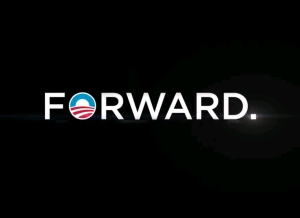
At this point, our analysis having reduced American politics to a vacuous fashion system, we might smirk sarcastically and conclude (not entirely without justification) that all the noise associated with the 2012 presidential election has at no point achieved the status of a substantive debate about the nation’s troubled circumstances, and has instead amounted to a pointless and protracted assault on our attention and our dignity: two entrenched constellations of lifestyle enclaves singing traditional fight songs and hurling customary insults at one another. We could conclude that the whole of American civic life adds up to a compulsive reiteration of the social dynamics of a high-school cafeteria, with every clique defined exclusively by its relationship to other cliques in a fixed hierarchy and otherwise devoid of significance or content.
All of that may indeed be the case. Even so, it’s an approximately opposite conclusion that I’d like try to advance here.
As tawdry, stupid, petty, and degrading as our public discourse undoubtedly is—on both sides, and in every direction—there are real stakes on the table: we’re going to be living in a significantly different country four years from now depending on how Tuesday plays out. (And you are hearing this from a guy who unapologetically voted for Ralph Nader in 2000. Calm down; I was in Texas.) While I do believe that most of us decide our affiliations (political and otherwise) at a visceral, emotional, preconscious level and then rationalize them with evidence and analysis after the fact—and I also think it’s clear that some big dollars get spent in efforts to appeal directly to those preconscious attitudes in order to influence our behavior in all kinds of benign and sinister ways—I do NOT think it naturally follows that we should mistrust or reject our visceral reactions. Instead, we should examine those reactions and try to figure out how we came by them, what emotions animate them, and what principles they endorse. My point, in a nutshell, is this: calling Mitt Romney a douchebag is not—or, okay, is not just—a coarse ad hominem attack. It’s also a legitimate articulation of opposing values.
Calling Mitt Romney a douchebag is, for instance, a way of saying that he displays a cavalier disregard for facts. This is not the same thing as calling him a liar; to my way of thinking, in the context of a presidential election, it’s actually worse: liars respect facts enough to know when they’ve parted company with them. Pretty much all candidates for national office lie, in an elbow-throwing, hard-checking, if-you-ain’t-cheatin’-you-ain’t-tryin’ sort of way: Obama and his team certainly cherry-pick statements to paint him in a better and Romney in a worse light, but as lame as this practice is, it really just amounts to spin. Romney’s inconsistencies and factual detours are of a very different order—the kinds of things that make you think surely dude knows people are going to check him on this before you realize that he doesn’t care if anybody checks him.
The highlight reel so far—painfully familiar, but still worthy of review—includes the following: Romney wouldn’t cut taxes for the wealthy; his tax plan wouldn’t add to the deficit; he would maintain full funding for Pell Grants and FEMA, allow no restrictions on insurance coverage for contraception, and keep in place the most popular benefits conveyed by the Affordable Care Act; aside from forcing Chrysler into the Little-Red-Book-fondling hands of the Italians, the federal bailout of the auto industry was implemented exactly as he recommended; he doesn’t favor the strict enforcement of current immigration laws; the stimulus didn’t work; Obama made an “apology tour” of the Middle East after he took office; these are not the droids we’re looking for; and so forth. Every bit of this is either demonstrably factually untrue or has been directly contradicted by the candidate himself.
Romney’s tendency to just make stuff up has a number of troubling implications, but the most obvious one is this: despite the famous contrary assertion by Republican strategists (which I seem hell-bent on referencing in every post: check!), the President of the United States does not get to pick the reality that he or she governs in. Candidates like Romney, for whom candidacy is a full-time job, incur little risk by treating facts with contempt: they occupy no elected office and therefore have none to lose, and if they win they can defend against attempts to hold them to statements they made during the campaign by citing occasions when they stated the exact opposite. But presidents need facts to do their jobs; indeed, the job largely consists of weighing the quality and value of available information to determine a course of action. The terrorist is either in the compound or he’s not; the rogue state will either negotiate or it won’t; the bill either has the votes to pass or it doesn’t. The American electorate has a reasonable expectation of being told how a particular candidate will respond within the bounds of possibility to real conditions once he or she has taken office; Romney’s refusal to do so—or to acknowledge why people might care—is a total douchebag move.
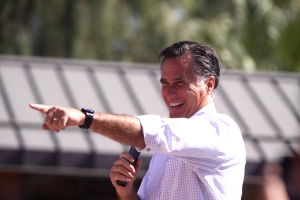
But that ain’t the half of it, kids. Calling Mitt Romney a douchebag is also, critically, a way of saying that there’s just no there there with this guy.
And this is a really big problem. For a long time now (I can refer you to Mark Fisher for some interesting assertions as to just how long) political rhetoric in Western democracies has been unable to support a serious dialogue regarding just about anything of real consequence: it can acknowledge, to a limited extent, the many impending disasters that the world now faces, but realistic suggestions as to how these problems might be solved cannot be posited without being instantly dismissed as “politically impossible.” Examples of these unspeakable subjects include aggressive regulation to limit carbon emissions, the implementation of a national single-payer healthcare plan, across-the-board tax increases at every income level to shore up entitlement programs and pay down the national debt, honestly confronting the ugly legacy of the United States’ conduct in developing nations during the Cold War, creating disincentives to the speculative trade in financial instruments, setting constitutional limitations on campaign financing and the rights of corporate entities . . . you get the picture. All of these topics are “unrealistic,” which is unfortunate because they’re also absolutely necessary: very likely the only approaches that stand a chance in hell of effectively forestalling various looming catastrophes. Anybody with any genuine desire to see these problems addressed ought to be working to enable a public discourse in which these options can be put on the table and evaluated on their merits. There are worse places to begin the project of rehabilitating public discourse than making sure Mitt Romney is not only defeated but discredited on Tuesday, called out for his irresponsible rhetoric on the national stage.
Cuz here’s the thing: with disproportionate thanks to Governor Romney, the 2012 presidential election has actually moved us farther from a capacity to talk about serious stuff. Instead of adopting a bunch of transparently insane but laser-beam-consistent positions and refusing to budge from them—i.e. the Tea Party approach—Romney has declined to take a steady position on much of anything. This is an even bigger deal than the contempt for facts mentioned above: it engenders the absurd spectacle of an enormously expensive and closely-fought presidential election that’s almost completely devoid of politics.
I’m going to say that again: since the conventions, there have been almost no politics discernible in Romney’s campaign. This is not a good thing. Although there are obvious ideological and policy differences between the two major parties, and there’s no question that Romney and Obama would govern very differently, we’ve increasingly had to infer those differences from behind Romney’s ecumenical general-election smokescreen. The public statements that Romney has made in the very recent past (this was particularly apparent in the final debate) have conveyed a consistent message, which is that Romney plans to pursue the Obama administration’s aims using the Obama administration’s methods, but to do so more effectively than Obama has. If we limit ourselves to the public declarations issuing from the candidate’s own mouth—which is not possible since, as mentioned previously, they are almost always at variance with the facts, or with his own earlier statements, or both—then we are forced to conclude that Romney will differ from Obama in his extension of Bush-era tax cuts for the very wealthy, his readiness to privatize Medicare, and his belief that certain federal initiatives should be implemented by the states but remain otherwise unchanged. That’s pretty much it. Romney’s refusal to own and inhabit any single policy position for much longer than it takes him to draw his next breath is not only frustrating but also damaging, in that it further erodes the rhetoric available to all of us to argue productively about much of anything.
This is also pure, classic, peerless douchebag behavior. I really don’t believe that Romney intends to be deceptive; he just doesn’t see any value in wandering in the ideological weeds when that isn’t what—at least to him—this election is about. “I can get this country on track again,” he said during his closing argument in the second debate. “We don’t have to settle for what we’re going through.” He decorated these two sentences with a catalogue of not-too-specific promises of what he’d accomplish as president, none of which was escorted by an explanation of how he’d achieve it, all of which are also identifiable as goals of the Obama administration.
There’s a telling quote from one of the aides on Romney’s 2002 Massachusetts gubernatorial campaign in a recent New Yorker piece by Nicholas Lehmann: “Mitt Romney believes in his competence as a manager,” the aide says. “If he’s elected, he’ll do an adequate job of dealing with the issues of the day. He’s not a vision guy. He’s not policy-driven. He thinks he’ll do a good job.” Romney’s sales pitch to the electorate is simply that he’ll be a better president than Barack Obama has been. Dyed-in-the-wool douchebag that he is, he believes this to be utterly self-evident, almost not worth articulating. He honestly doesn’t understand why anybody would need to know exactly what his values are, given that he’s already spelled out his qualifications. He’s absolutely confident in his ability to turn the country around, and he expects people to share his confidence.
Well, he expects 53% of people to share it, anyway. Some weirdoes you just can’t do anything with.
The defining words of Romney’s 2012 campaign—the infamous remarks surreptitiously recorded at a Boca Raton fundraiser—provide abundant evidence of his willingness to tell different stories to different audiences. This incident was initially assessed as damning because it was thought to show Romney’s true colors on display while safely surrounded by other members of his class; I disagree with that interpretation. I think what we hear in the Boca Raton video is a candidate whose comfort level is conspicuously inversely proportional to the number of people he thinks can hear him talking.
In his initial attempt at overdubbing these comments, Romney described them as “not eloquently stated.” The trouble with that characterization is that he’s more eloquent in the Boca Raton video than he’s been at any other point in the campaign: cogent, candid, forceful, decisive, at ease, in his element. By “in his element” I don’t just mean that he’s hanging out with other super-rich folks, but rather that he’s among people with whom he feels he has a business relationship—his investors, more or less—and for whom he’s in the midst of conducting an analysis. This is how I’m going to get the deal done, he’s saying. This is why it’s worth fifty grand to have dinner with me. He sounds kind of great, frankly. I listen to these remarks and I think: damn, this guy should be in charge of something—something other than the executive branch of the federal government.
The problem with the popular caricature of Mitt Romney as Mr. Moneybags Businessman is not that it’s inaccurate, but that it’s imprecise. There’s capitalists and there’s capitalists, and Romney has been a capitalist of a very particular sort: not an entrepreneur, or a CEO, or even a hedge fund manager, but a private-equity guy. Lehmann’s smart and evenhanded New Yorker piece is really strong on Romney’s experience at Bain Capital, and on what that experience suggests about the way the candidate understands leadership and governance:
Within private equity, people don’t talk about the questions that are on the mind of the public. One professor at a leading business school whose subject is private equity put it simply: “Can I change the free cash-flow equation of the company? If I do, I win. If I don’t, I lose. It’s not the job of private equity to create jobs. The job is to create value. That sometimes creates jobs, and sometimes not.” A comprehensive study of private equity published last year found that the industry has a negligible effect on employment. Private equity is business on steroids: seek efficiency and economic return, not large social goals (unless you think those are large social goals).
If we can get a gigantic and one-hopes-obvious cavil out of the way right off the bat—i.e. that private equity operates largely by dumping unprofitable assets, while government at every level exists to provide services that will never be attractive to the private sector, and therefore any suggestion of equivalency between the two spheres is kind of insane—then I think certain operational aspects of private equity do make for compelling analogy with the office of the Presidency. A new president, for instance, always takes over the management of an established organization; thanks to term limits (rather than the need to repay debt) he or she has limited time to get stuff done; replacing upper management is always the first order of business. The most illuminating similarity may involve the fraught and contentious circumstances under which the president takes office, and the disproportional importance of this process: national election as leveraged buyout.
“Romney likes to say that he was a consultant or a venture capitalist, not that he was in private equity,” Lehmann writes. “Consultants think that people in private equity make most of their money from the way a deal is structured (Bain Capital aggressively pursued that aspect of its business), not from how well they analyze a company and its problems.” This seems consistent with Romney’s orientation as a candidate: he’ll say whatever he needs to say and promise whatever he needs to promise to get American voters to sign on the dotted line—provided, of course, those promises aren’t binding and can be unwound later—with the expectation that he’ll have no trouble sorting out the operational specifics after he’s been sworn in. He’s done it before! A bunch of times!
And on the outside chance that Romney does get himself elected next week—unlikely, but still, all hands on deck!—then rest assured those specifics will be sorted out in short order. Romney may not have been shy about using his veto pen during his tenure as Massachusetts governor, but he was also notably content to let the Democratic legislature set the broad agenda for the Commonwealth; given the determined lack of vision that Romney continues to display, there’s every reason to think that his presidency would run along the same lines. The major difference, of course, is that Romney’s own party would hold a filibuster-enabled minority in the Senate and an outright majority in the House—so it’s Congressional Republicans who’d be doing the agenda-setting for the next four years. While we can certainly hope that a President Romney would shake the Etch-A-Sketch again and redeploy his Beacon Hill moderate mode, it seems rather more likely that he’d devote himself to activities such as reengineering the operations of various regulatory apparatus to improve their “efficiency,” while the largely unimpeded House Republicans move to advance their lunatic disassembly of the commons.
The biggest piece of evidence that Romney is prepared to sit in the grandstands with a stopwatch while the Tea Party Caucus speeds around the track is, obviously, his selection of a running mate. After Paul Ryan joined the ticket, there was a flurry of punditry that attempted to read Romney’s own ideals—pliable, and therefore hard to pin down—through his veep pick. Did it mean that Romney was on board with the aggressive policy recommendations of Republican Party’s primary elected wonk? Or that he perceived a need to borrow somebody else’s intellectual credentials to cover his own disinterest in policymaking? Or that Romney’s position relative to his own party was weak, and he was badgered into making the pick? At this point I think it’s become clear that these questions are irrelevant, as they credit Romney with a range of concerns that he simply doesn’t possess.
The conventional wisdom is that vice-presidential picks are used to shore up perceptions of weakness at the top of the ticket: Reagan picked Bush père for his foreign-policy cred, Bush père picked Quayle for his glamor and good looks (whoops), Clinton picked Gore for his technocratic gravitas, Obama picked Biden for his earthiness. (Cheney picked himself, of course.) I think we can be reasonably sure that Romney picked Ryan not although but rather because he’s a strident ideologue and an energetic leader who makes a lot of people nervous. He was picked, in other words, to mitigate Romney’s douchebag problem.
The Republican bench is not deep; I don’t have too many suggestions for better picks. Still, while Ryan seems to have helped Romney invigorate the conservative base—which is certainly worth something—if the main goal was to attract folks in the skittish middle, I’m not sure this plan worked. For while a great number of Americans do not seem to regard Paul Ryan as a douchebag, they do, unfortunately, regard him as an asshole.
Why is this so? When we call somebody an asshole, what do we mean?
This is an easier question to answer: for the sake of expediency, we can situate the asshole in relation to the douchebag. If, as Wikipedia tells us, a douchebag possesses “a variety of negative qualities, specifically arrogance and engaging in obnoxious and/or irritating actions, most often without malicious intent,” then you can get to asshole simply by deleting that final clause. The asshole relishes making enemies, running in packs, drawing lines in the sand. The asshole’s belligerence comes from the fact that while he shares the douchebag’s disinclination to introspect, he does NOT share the douchebag’s absolute confidence. The asshole knows that a lot of people—MOST people—don’t like him, don’t share his interests or values, would like to see him taken down a peg. He knows himself to be a member of a privileged minority, and he knows that a functional democracy will tend to erode his privileges, and he’s prepared to fight like hell to defend what he’s got. Therefore he has no interest in coalition-building, he avoids the concept of fairness, and he not only accepts but insists that his own team gets to play by a different set of rules. You can see this clearly in the faces of smart conservative assholes, of which Paul Ryan is certainly one: an awareness of how the deck is actually stacked, an understanding of what it will take to keep it that way, and a barely-submerged terror of how easily their regime could be swept aside.
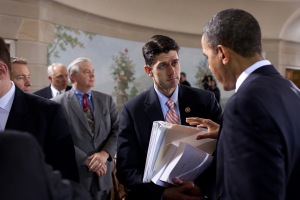
As nationwide demographic trends assemble themselves into a wrecking-ball aimed squarely at the Republican Party, you can bet you’ll hear the voice of the asshole shouting ever more shrilly on the national stage. Leaders like Paul Ryan are good at moderating their tones to appear more reasonable than they are, and also at camouflaging their most thuggish initiatives in a blizzard of data. To discern this voice in its purest form it’s best to listen at the margins, to the angry faces that fill out the crowds at campaign rallies. Here is where you’ll hear asshole ideology most clearly expressed—in the unalloyed valorization of entrepreneurs, in the oft-uttered assertion that no one who hasn’t run their own business has a right to criticize or impose upon anyone who has, in the declaration that the majority of Americans are parasites living off government aid or off the largess of their employers. As if this is not only an accurate but an obvious characterization of the state of the union. As if a nation of entrepreneurs were possible or in any way desirable: an ecosystem consisting entirely of sharks.
As President Obama and his various surrogates have been at pains to point out, the 2012 presidential election is about values, about choosing who we as a nation want to be. There are many ways to pose this question. Here’s mine: do we really want to live in a country that’s governed by—and for the benefit of—a bunch of douchebags and assholes?
I’ll see y’all on Tuesday.
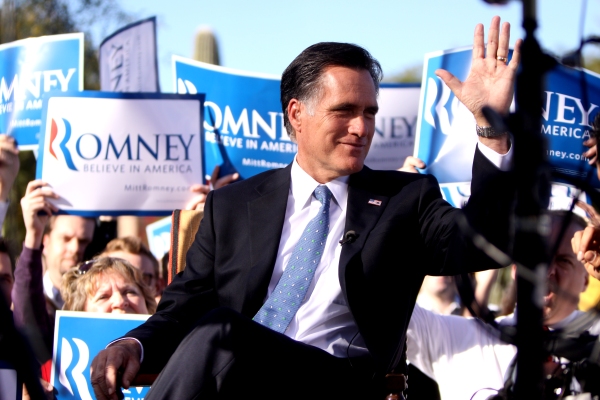
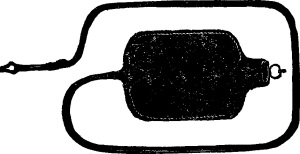
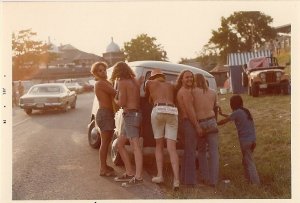

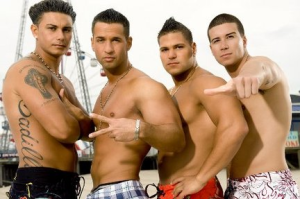
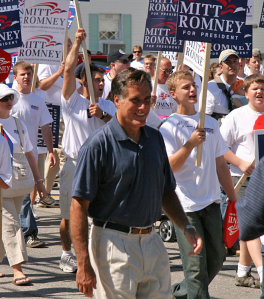
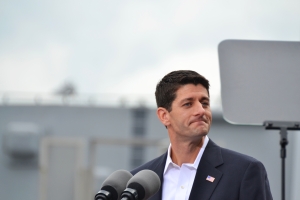
ahhh, so now I understand why you had to rush home last night :)
‘Fraid so. Thanks, Josh!
“There are many ways to pose this question. Here’s mine: do we really want to live in a country that’s governed by—and for the benefit of—a bunch of douchebags and assholes?” Brilliant. Can you please moderate at least one of the debates the next time we have a presidential election?
Terrific post! I’ve always thought of Donald Trump as the quintessential, prototypical douchebag myself.
By the way, I also voted for Nader in 2000 in Texas. I witnessed an argument this weekend about the ethics of voting for a third-party candidate in a swing state, which is why I think it would be cool if we had negative voting.
After what, almost 2 years of this crap? This is my very favorite thing written about the election that I have read. Good fucking job, man.
@K — Thanks, spouse! Re the 2016 debates, I’ll have my agent make some calls.
@EG — Thanks! I ALMOST worked Trump into this post. I tend think of him as more of an asshole, if only b/c I really, really suspect that he knows what a complete fraud he is, but your point is compelling. My favorite factoid about Trump is that when Forbes or whoever is making its list of the wealthiest Americans, they always look at Trump and are like: whoa, look at how leveraged this guy is! Once you balance the books, does he have, like, ANY money?!? And then Trump’s people will basically call them up and browbeat them into saying he’s rich. He’ll probably sue ME for typing this. Bring it, Donald!
When I was working in the bookstore in Boston, I would occasionally encounter a customer who was a total douchebag of the 2002 sort — tan, gel-spiked hair, biceps and pecs, popped collar, etc. — and every time, the guy was looking for Trump’s book The Art of the Deal. EVERY TIME.
Negative voting! That’s awesome. I like it. Nevada, I believe, lists “none of the above” as a ballot option, but this is way better. I remember back in the ’90s there were high hopes on the left for the national adoption of electoral fusion as it is practiced in New York — the idea being that, say, Obama might get the nomination of both the Democratic Party and the Working Families Party, and he’d be listed separately for each. Voting for Barack on the Working Families line would therefore communicate your support for a more progressive platform than the Democrats’ — and of course you could also vote for Working Families candidates farther down the ballot in races where there was no danger of tipping the thing to the fascists. Sadly, as is so often the case, the Supreme Court pooped on the expansion of the idea.
@Bridget — Hey, thanks! I’m glad you stopped by!
Martin, this is as clever and well-written as anything else you’ve written. The only problem is that you’re wrong. Mitt Romney is an asshole.
His malicious intent is apparent in the way he’s made a sport of tormenting gays—see, for instance, this:
http://www.washingtonpost.com/politics/mitt-romneys-prep-school-classmates-recall-pranks-but-also-troubling-incidents/2012/05/10/gIQA3WOKFU_story.html
Not to mention bullshit like this:
http://www.businessweek.com/articles/2012-08-09/romney-explains-his-famous-bain-photo
Nothing he’s said or done since then—including the anti-gay pro-business policies he both undertook while governor and has consistently promoted—indicate to me he’s changed a whit. The man is petty and malicious through and through—not to mention abhorrent!
Cheers,
Adam
Oh, and I, too, voted for Nader/LaDuke in 2000—by means of absentee ballot in PA, which Gore won. I also campaigned for the Greens in Illinois, which Gore also won.
I strongly considered voting for Stein/Honkala this year, because living in Chicago means I get to support whatever presidential ticket I most like. But in the end I went with Obama/Biden, partly because I genuinely like a lot of things about the current Democratic ticket/party (I’m registered independent), and partly because I don’t want to see Obama lose the popular vote. (Yes, I know Obama supports drones and didn’t close Guantanamo, etc.)
I did get to vote for the Green Party this time out re: our Metropolitan Water Reclamation District Commissioner.
More cheers! Adam
Fantastic post–how long did it take you to craft this?
@Adam — Thanks for the comments, and the links, which I encourage everybody to click through to. This is a tricky needle to thread — and bracketing the issue of taxonomy, I want to clearly state that Mitt Romney is a morally reprehensible figure whose role, in any reasonably just society, would be relegated to washing dishes in a medium-security prison — but I’m going to stick to my guns re his douchiness.
I should, however, definitely clarify that I do NOT concur with the popular perception that douchebags are less deserving of opprobrium than are assholes. I think the cluelessness that absents active malice from the typical douchebag’s appalling behavior is probably more damaging in more ways than the injuries flagrantly inflicted by the average asshole, if only because it’s easier to emulate and harder to condemn. If the douchebag inhabits a position of privilege, it’s even worse. This may be a somewhat eccentric view, I admit.
Based on all the accounts I have seen of Romney’s battery of John Lauber in 1965, it seems like something that he should have — and WOULD have, had he grown up in a different family, fifteen or so miles to the southeast — done time for. The incident is disgusting, Romney’s failure to speak of it in a way that indicates any understanding of the seriousness of what he did is MORE disgusting, and it is ABSOLUTELY relevant to the election.
But regarding the matter at hand, the key line for me in the Washington Post story is Romney’s quoted reaction to Lauber’s appearance: “He can’t look like that. That’s wrong. Just look at him!” These are the words of a person who believes himself to be defending normalcy, who thinks his actions are desired and authorized by all decent people, who’s convinced that it’s in everyone’s best interest — including his victim’s, who just needs to be set back on the right path — that he humiliate this weirdo. An asshole would be content to cut the kid’s hair off for fun, and would pick him as a target simply because he was weak. There would be no pretense of a higher purpose. The fact that Romney believed himself to be operating as an agent of righteousness makes the whole incident even creepier. (You can imagine a teenaged John McCain, for instance, pulling a similar stunt, but he wouldn’t wrap himself in the flag while doing it.)
Yay Greens! I threw their MWRD candidates a little love this year too . . . although Debra Shore seems to be a real class act, and tends to get my vote.
@Joe — Thanks, man! This one took about a month; I was kind of hoping Sandy would buy me extra time, but no dice.
Yay! Brilliant, brilliant, brilliant.
I especially love this concept of douchebag as someone who lives confidently with the knowledge that they speak from the authoritative position. One of the minor sideshows that has fascinated/enraged me during this election has been Romney’s appropriation of “Clear Eyes, Full Hearts, Can’t Lose.” As a major Friday Night Lights lover (requisite “everybody must watch if you haven’t, it’s not just about football, blah, blah, blah”), it killed me that Romney assumed that “football, Texas, white people” = him and his message, when in fact the personal politics of the show stood for everything that Romney is against. Classic douchebag move!
As usual, a wonderfully insightful and funny look into our culture. Nice work, Martin! You made Nick and I laugh out loud a couple times and that’s hard to do when we are reading about politics.
@Christen — Hey, thanks! I’m unfamiliar with FNL (having myself gone to high school in Texas, I guess it’s always seemed too close for comfort), but I can see your point nevertheless. I think I remember hearing (no idea if this is true) that Romney just saw the phrase(s?) on a poster somewhere and started using them. It is also a douchebag move to assume that just because you have noticed something and identified it as a thing of worth you are now qualified and authorized to use it as if it is your property.
Don’t you wish Romney had kept up his practice of singing “America the Beautiful” at campaign rallies, with Shatneresque spoken interpolations? I know I do. Between that and Barack’s Al Green, this has got to be the singin’est election in presidential history. We maybe could have saved everybody time, money, and aggravation by just settling this thing on The Voice . . .
@B — My thanks to you and Nick! Gotta laugh to keep from cryin’, right?